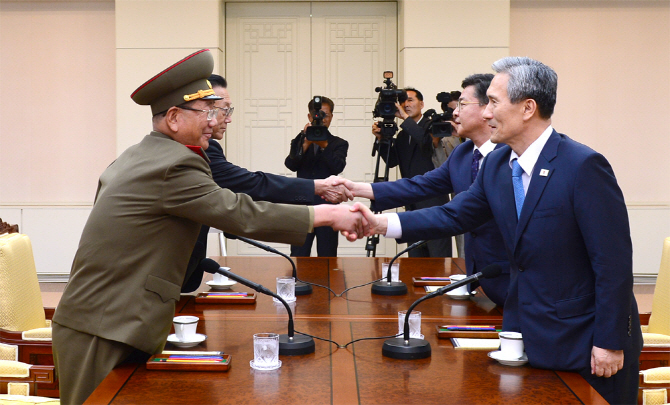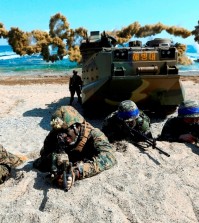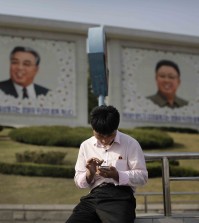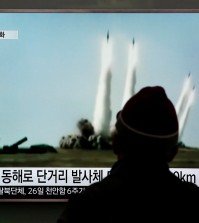- California Assembly OKs highest minimum wage in nation
- S. Korea unveils first graphic cigarette warnings
- US joins with South Korea, Japan in bid to deter North Korea
- LPGA golfer Chun In-gee finally back in action
- S. Korea won’t be top seed in final World Cup qualification round
- US men’s soccer misses 2nd straight Olympics
- US back on track in qualifying with 4-0 win over Guatemala
- High-intensity workout injuries spawn cottage industry
- CDC expands range of Zika mosquitoes into parts of Northeast
- Who knew? ‘The Walking Dead’ is helping families connect
North Korea committed to improving ties with South: NK official

In this Aug. 22, 2015 file photo provided by the South Korean Unification Ministry, South Korean National Security Director, Kim Kwan-jin, right, and Unification Minister Hong Yong-pyo, second from right, shake hands with Hwang Pyong So, left, North Korea’ top political officer for the Korean People’s Army, and Kim Yang Gon, a senior North Korean official responsible for South Korean affairs, during their meeting at the border village of Panmunjom in Paju, South Korea. (The South Korean Unification Ministry via AP)
SEOUL (Yonhap) — A senior North Korean official said Thursday his country will work “actively” to improve relations with South Korea based on the spirit of a recent landmark agreement between the two sides.
Kim Yang-gon, Pyongyang’s top official handling inter-Korean ties, also called on the two sides to move in a constructive direction toward the reunification of the Korean Peninsula.
“Based on the spirit of the urgent high-level contact between the North and South, we will work actively to improve North-South relations, in line with the aim and wish of our people,” he said in an interview with the North’s Korean Central News Agency.
Kim took part in the 2+2 high-level talks from Saturday through Tuesday, which led to a breakthrough agreement in which the North expressed regret over a land mine attack that maimed two South Korean soldiers. In return, the South halted anti-Pyongyang loudspeaker broadcasts along their border.
The talks took place in the truce village of Panmunjom inside the Demilitarized Zone that divides the two Koreas as tensions flared up following the Aug. 4 land mine explosion that prompted the loudspeaker broadcasts and an exchange of artillery fire across the border.
Two days before the talks, North Korean leader Kim Jong-un ordered his troops to be on a war footing and declared a “semi-state of war.”
Kim Yang-gon expressed relief that the tensions were defused through the talks, saying he is “pleased” that the two sides were able to create a turning point for better inter-Korean ties.
However, he stressed the importance of maintaining the current mood to move inter-Korean ties toward reunification.
“We must work to ensure that the North and the South do not get entangled in mysterious incidents as we did this time and worsen the political situation and drive it to the extreme,” he said. “As we mark the 70th year of our nation’s independence this year, our view to creating a great change, a great revolution in North-South ties and opening a grand path to autonomous reunification is consistent.”
Kim’s remarks contrast with those of Hwang Pyong-so, the chief North Korean delegate to the talks, who told domestic audiences via state television Tuesday that he believes the talks taught the South a lesson not to create “groundless cases” and “provoke the other side.”
Hwang, the chief military official for political affairs, was apparently referring to the land mine attack the South blamed on the North.
The six-point deal included an agreement for further talks between the two sides, a resumption of temporary reunions for families separated by the 1950-53 Korean War, the lifting of North Korea’s “semi-state of war,” and increased civilian exchanges.
















